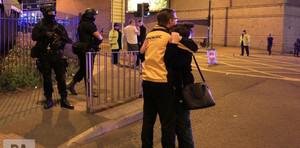Manchester attackManchester bomber had close connections with Manchester criminal gang
The Manchester police say that the Manchester Arena suicide bomber, Salman Abedi, had close connections with criminal gangs in the city, as well as an association with a terrorist recruiter. Abedi, 22, was associated with a gang which has for years been waging war with a rival fang in south Manchester. People who knew Abedi say that he was deeply upset when one of his close friends became involved in a violent gangland feud, and some friends said that this trauma may have added to his feeling of disillusionment and anger.

Terrorism plus gang activity yields an event like the Manchester Arena bombing // Source: theconversation.com
The Manchester police say that the Manchester Arena suicide bomber, Salman Abedi, had close connections with criminal gangs in the city, as well as an association with a terrorist recruiter. The Manchester Evening News reports that Abedi, 22, was associated with a gang which has for years been waging war with a rival fang in south Manchester.
People who knew Abedi say that he was deeply upset when one of his close friends became involved in a violent gangland feud, and some friends said that this trauma may have added to his feeling of disillusionment and anger.
Community leaders in south Manchester say that have become increasingly worried that young men of Libyan heritage are being drawn into gang warfare in south Manchester.
In February, there were news reports of rising tensions between two south Manchester gangs – one made up largely of people of Libyan descent, the other by people of Somali heritage.
One community leader, who asked not to be named, told the Guardian: “There is a growing gang culture among young Libyans. It is a huge worry in the community.”
He said that many of the Libyan gang members — like other inner-city gangsters — grew up with distant or missing fathers: “Abedi is like that. His father left for Libya when he was around 17. He’s had five years without strong paternal guidance.”
A family friend, Ahmed Boshaala, said Abedi could have been affected by the gangland trouble his friend was involved in.
Boshaala, a former chemistry professor at Salford University, said: “There were many things going on with Salman. He was being put under pressure and persuaded by someone, but then yes there was also this [incident] which could have affected him. We cannot be sure exactly what was going on with him.”
The police said they were also investigating Salman Abedi’s association with Raphael Hostey, who was killed last April in a U.S. drone strike in Mosul.
Hostey, a convert to Islam, has sponsored hundreds of terror recruits. The Guardian earlier this published an investigation which showed that sixteen convicted or dead terrorists lived within 2.5 miles of each other in south Manchester. They were part of a radical network and some prayed at the same mosque.
